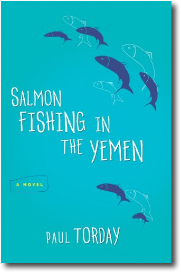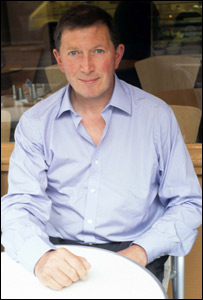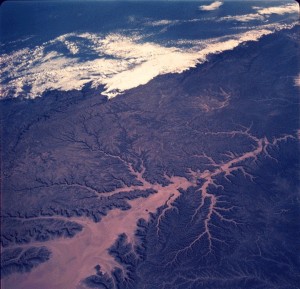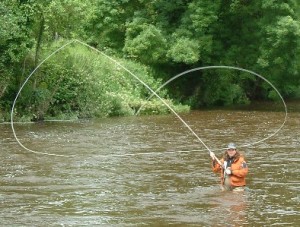“The prospect of introducing salmon to the wadis of the Hadramawt seems to me, quite frankly, risible…. The project is not only totally absurd and scientifically nonsensical, but if we allow our name to be involved, no one in the fisheries world will ever take us seriously again.”
O ne of the most delightful and original satires I’ve read in ages, this debut novel pokes fun at just about every aspect of British society, from government spin-meisters and crass politicians to marriages of convenience, TV interview programs, consumerism, and the belief that many of the world’s problems would be solved if only other people were “more like us.” What makes this satire particularly refreshing is that the author writes it with a smile on his face, obviously preferring to prick balloons with his witty needling, rather than wield a rapier in a slashing attack.
ne of the most delightful and original satires I’ve read in ages, this debut novel pokes fun at just about every aspect of British society, from government spin-meisters and crass politicians to marriages of convenience, TV interview programs, consumerism, and the belief that many of the world’s problems would be solved if only other people were “more like us.” What makes this satire particularly refreshing is that the author writes it with a smile on his face, obviously preferring to prick balloons with his witty needling, rather than wield a rapier in a slashing attack.
The absurdity begins on the first page, with a startling letter from an estate agent to Dr. Alfred Jones, a fisheries scientist whose crowning achievement to date is an esoteric paper entitled “The Effects of Increased Water Acidity on the Caddis Fly Larva.” The agent, Harriet Chetwode-Talbot, has a client “with access to very substantial funds” who wants to sponsor a project to introduce Scottish salmon and the sport of salmon fishing into the wadis of the Yemen during the yearly rains.

Mild-mannered and unimaginative Alfred Jones ignores this letter, finding the whole idea ludicrous, until the Foreign and Commonwealth Office and eventually the prime minister, Jay Vent, exert the kind of pressure that makes refusal impossible. The PM’s office favors this effort for its “environmental message,” the new links it will forge to a Middle Eastern country, the technological “improvements” it will bring to an Islamic state, and not incidentally, the huge, positive news story that just may push stories of Iraq, Iran, and Saudi Arabia off the front page.
Through letters, e-mails, memos, diary entries, newspaper articles, records of the House of Commons, interviews, and even intercepted al-Qaeda e-mail traffic, the story of Alfred’s efforts to create a suitable environment for salmon in the mountains of western Yemen unfolds. Gradually, Alfred becomes intrigued with the research possibilities of the project, and his contact with His Excellency Sheikh Muhammad ibn Zaidi bani Tihama, an avid salmon-fisherman who lives part of the year on a Scottish estate, introduces him to private jets, opportunities to travel, and a life that is more intriguing than anything he has experienced to date.
Alfred i s married to Mary, a highly paid financial executive who works around the clock at her job in Geneva, where she expects to remain for two years. They have just celebrated their twentieth anniversary, for which Alfred has given Mary a subscription to The Economist, and she has given him a new electric toothbrush. Obviously, Alfred and Mary lack imagination, though neither of them seems to notice—until Alfred starts to open himself to the wider world with his new assignment. Soon Alfred begins to resent Mary’s high-handed demands and her selfishness—and he finds Harriet Chetwode-Talbot, with whom he is constantly working, especially attractive.
s married to Mary, a highly paid financial executive who works around the clock at her job in Geneva, where she expects to remain for two years. They have just celebrated their twentieth anniversary, for which Alfred has given Mary a subscription to The Economist, and she has given him a new electric toothbrush. Obviously, Alfred and Mary lack imagination, though neither of them seems to notice—until Alfred starts to open himself to the wider world with his new assignment. Soon Alfred begins to resent Mary’s high-handed demands and her selfishness—and he finds Harriet Chetwode-Talbot, with whom he is constantly working, especially attractive.
Within a framework that includes the salmon project in the Yemen, Alfred’s love life (or lack of it), and the sheikh’s broad vision of a more peaceful world achieved through fishing, the author manages to poke fun at every aspect of modern life. Government officials, of course, take credit for all Alfred’s work, when it is going well, but deny responsibility when there are problems. The foreign office believes that the Middle Eastern poor hate the British because they do not have the material benefits of western life. The government’s communications expert proposes a “Voice of Britain” TV channel and a quiz show called “Prizes for the People,” in which some poor Iraqi whose house has been bombed can win a dishwasher. Not even the “Bereavement Management Center,” which the army has set up to help families of servicemen, escapes the author’s attention and black humor.

As Alfred learns to “believe in belief,” thanks to the sheikh, his world expands, and when the prime minister insists on accompanying Alfred and the sheikh to the Yemen for the first release of ten thousand young salmon into the wadi, the scene is set for a grand finale. Filled with timely observations which emphasize life’s absurdities, a cast of characters who are constantly entertaining (though some are loathsome), and a unique and well-developed story line, this novel breaks new ground. There are not many satires that can be called “charming,” and there may be even fewer novels about salmon fishing that will completely captivate those of us who have never climbed into a set of waders. (On my list of Favorites for 2007)
Photos, in order: The author’s photo appears on http://www.jennybrownassociates.com
The photo of the wadis of the Hadramawt shows the dry riverbed and tributaries of the Hadramawt Plateau: http://www.vias.org
Salmon fishing in Ireland, demonstrated by premier salmon fly-fishing instructor in Ireland: http://www.ireland-salmon-fishing.net
